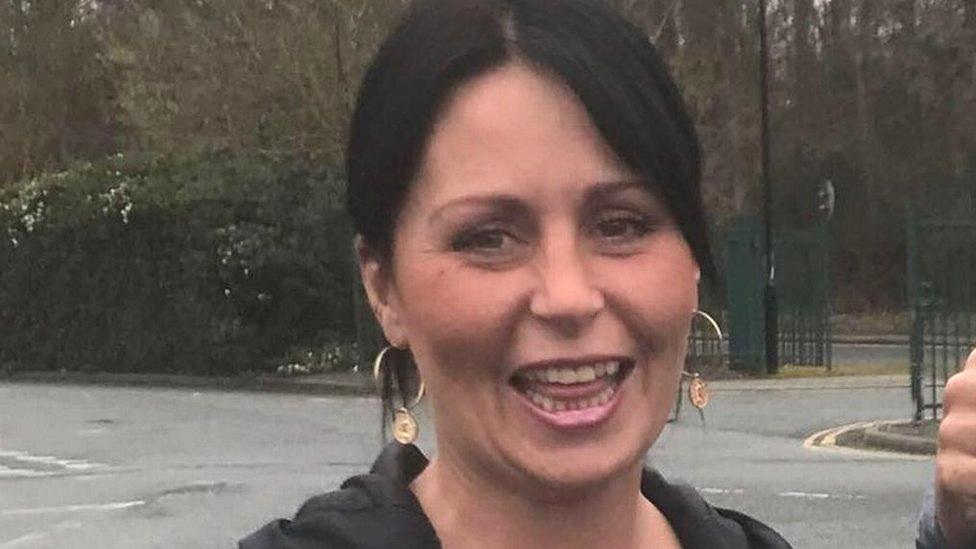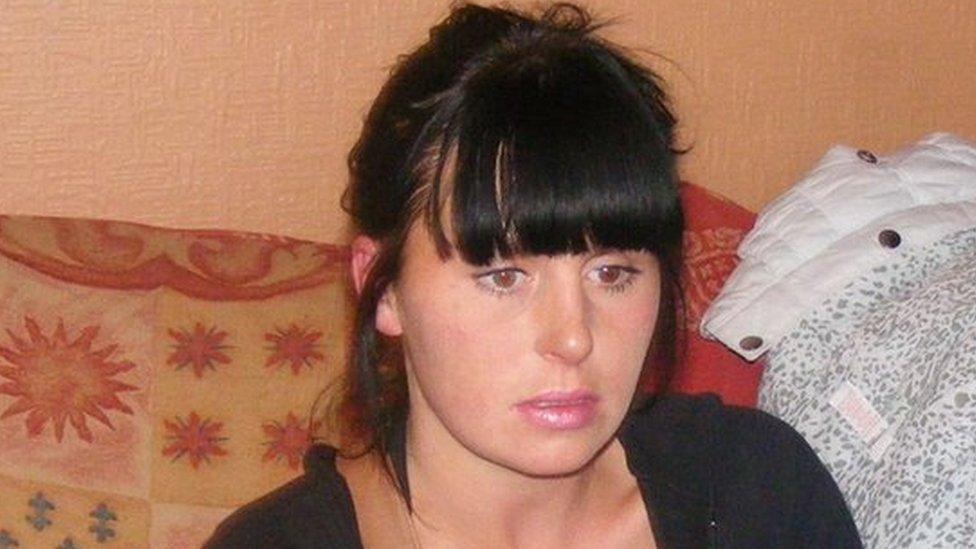Mum's hope homeless daughter's inquest will save lives
- Published

Tina Robson was 35 when she died at Bridge House Mission in Stockton
A woman whose daughter died from a drug overdose in a homeless hostel says she hopes an inquest will help save others.
Tina Robson, 35, died in her room at Bridge House Mission in Stockton from a fatal combination of drugs in July 2020.
Teesside Coroner's Court has heard Ms Robson, who had a history of drug addiction, moved into the shelter six days before her death.
Her mother Dr Sue Robson said lessons needed to be learned.
The inquest began with a video pen portrait in which friends and relatives paid tribute to Ms Robson, who originally came from Sunderland.
She was described as being a "bright and happy child", both "creative and sensitive" and "full of life and fun".
A support worker from Stockton Borough Council said the mother-of-one was stylish and always dressed well, adding that "despite her addictions" her "warmth and humour shone through".

Tina Robson grew up in Sunderland but was living in Stockton
In the video, Dr Robson said her daughter suffered trauma after a period living away from her when she was nine years old which affected the rest of her life.
The inquest heard Tina Robson's life had been "chaotic" and she had experienced sexual and domestic abuse as well as long-time addictions and was at risk of exploitation.
Assistant coroner Karin Welsh heard Ms Robson was "clearly intoxicated" when she returned to her room at about 12:30 GMT on 26 July 2020.
Dr David Scoones, a consultant pathologist at James Cook University Hospital, said several people were seen going in and out of her room over the afternoon and the alarm was raised at about 17:20 about her being "unresponsive".
She was confirmed dead by paramedics 15 minutes later, he said.
Tests found alcohol and drugs including cocaine, methadone and diazepam in her system, none of which were of fatal dosages on their own but which, when combined, caused her death, Dr Scoones said.
He said there were clear signs she had been an intravenous drug user and while there was historical bruising and marks, there were no recent injuries that suggested her death had been caused by foul play.
The inquest heard Ms Robson had been living "semi-independently" in a house in Thornaby supported by Thirteen Housing from December 2019 until the week before her death.
'Very vulnerable'
Angela Longstaff, a Thirteen Housing support worker for Ms Robson, said Ms Robson asked to move to Bridge House as she no longer felt safe in the Thornaby house, with incidents of her windows being broken.
Ciara Bartlam, who is representing Dr Robson, asked Ms Longstaff if that move could be seen as Ms Robson taking "a step backwards", to which the housing worker replied: "It was not our choice, that was Tina's choice."
Ms Bartlam asked if more details about Ms Robson should have been noted in her records, including a psychologist's view that she was "very vulnerable", having suffered psychological and emotional trauma as well as concerns raised by Mrs Robson.
Ms Longstaff agreed such information should have been recorded but was not.
Peter Booth, a rough sleeping outreach worker, visited Ms Robson in her Thornaby home and said it was "beautiful", and though while obviously under the influence of substances she was "functioning" and had capacity to make her own decisions, adding: "She knew what she was doing."
He said by July she was having problems with "children" who would call her a "smackhead" and repeatedly break her windows.
Ms Robson had stayed at Bridge House six times in the previous five years, the longest period for four months, but had left each time for various issues, the inquest heard.
'Finding fact not fault'
Julie Latham, who runs Stockton Council's homeless housing team, was asked by Ms Bartlam if Bridge House had been suitable for Ms Robson given her previous problems there.
Ms Latham said "yes", later adding there were no other options at the time.
Speaking before the hearing, Dr Robson, who had to raise £5,000 through crowdfunding to pay for her legal representation, said: "We are determined to ensure a full and fearless inquest into Tina's death.
"We need to fully understand the events that led up to her death and, hopefully, to ensure that other homeless women suffering life-long trauma and addiction are better treated, supported, and safeguarded."
Ms Welsh said the inquest was about "fact finding not fault finding".
The inquest is due to last four days.

Follow BBC North East & Cumbria on Twitter, external, Facebook, external and Instagram, external. Send your story ideas to northeastandcumbria@bbc.co.uk, external.